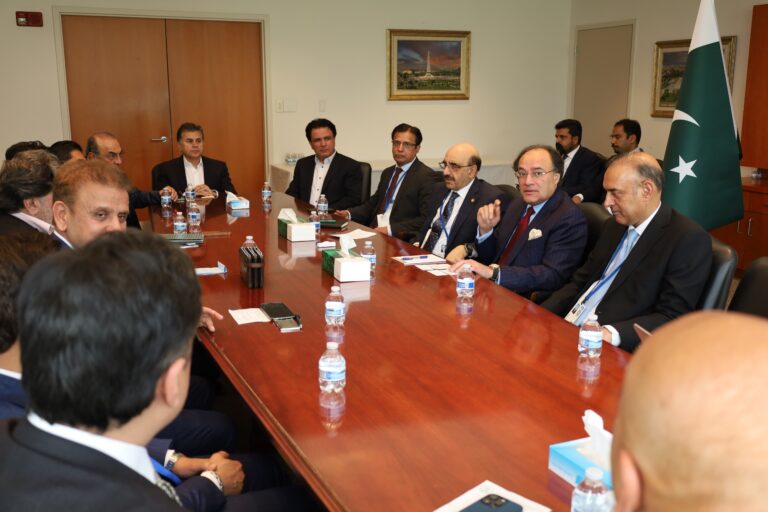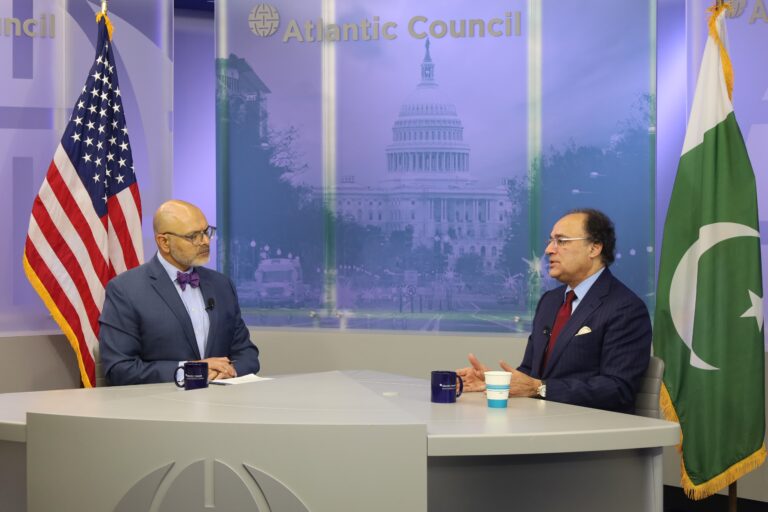Pakistan, IMF discussing new multi-billion-dollar programme: Aurangzeb

Business
Ready to engage in initial discussions with Pakistan on new loan deal: IMF spokesperson
Washington (AFP/APP) – Pakistan has initiated discussions with the IMF over a new multi-billion dollar loan agreement to support its economic reform programme, Finance Minister Muhammad Aurangzeb told AFP.
Pakistan is nearing the end of a nine-month, $3 billion loan programme with the International Monetary Fund designed to tackle a balance-of-payments crisis which brought the country to the brink of default last summer.
With the final $1.1 billion tranche of that deal likely to be approved later this month, Pakistan has begun negotiations for a new multi-year IMF loan programme worth 'billions' of dollars, Aurangzeb said during an interview in Washington.
"The market confidence, the market sentiment is in much, much better shape this fiscal year," said Aurangzeb, a former banker.
"It's really for that purpose that, during the course of this week, we have initiated the discussion with the Fund to get into a larger and an extended programme," he added.
An IMF spokesperson told AFP that the Fund is "currently focused on the completion of the current Stand-by Agreement programme," referring to the ongoing nine-month programme scheduled for completion shortly.
"The new government has expressed interest in a new programme, and Fund staff stands ready to engage in initial discussions on a successor programme," the spokesperson added.
'Three-year programme'
During his visit to Washington, Aurangzeb will also attend the spring meetings organized by the IMF and World Bank, which kick off in earnest Tuesday, with two clear objectives: to help countries combat climate change, and to assist the world's most indebted nations.
The meetings -- which bring central bankers together with finance and development ministers, academics, and representatives from the private sector and civil society to discuss the state of the global economy -- will kick off with the IMF's publication of its updated World Economic Outlook.
Pakistan held elections in February this year which were marred by allegations of rigging, with opposition jailed and barred from running, and his Pakistan Tehreek-e-Insaf (PTI) party subject to a crackdown.
The shaky coalition that emerged, led by Shehbaz Sharif, is now tasked with engineering an economic turnaround by implementing a raft of unpopular belt-tightening measures.
"I do think that we will at least be requesting for a three-year programme," Aurangzeb said. "Because that's what we need, as I see it, to help execute the structural reform agenda."
"By the time we get to the second or third week of May, I do think we'll start getting into the contours of that discussion," he added.
Balancing US-China rivalry
Pakistan has close economic ties to both the United States and China, which has put it in a tricky position as the two countries have embarked upon a costly trade war.
"From our perspective it has to be an and-and discussion," Aurangzeb said when asked how the Sharif government plans to conduct its trading relationships with the world's two largest economies.
"[The] US is our largest trading partner, and it has always supported us, always helped us in terms of the investments," he said.
"So that is always going to be a very, very critical relationship for Pakistan."
"On the other side, a lot of investment, especially in infrastructure, came through CPEC," he said, referring to the roughly 1,860-mile long China-Pakistan Economic Corridor designed to give China access to the Arabian Sea.
Aurangzeb said there was a "very good opportunity" for Pakistan to play a similar role in the trade war as countries like Vietnam, which has been able to dramatically boost its exports to the US following the imposition of tariffs on some Chinese goods.
"We have already a few examples of that already working," he said. "But what we need to do is to really scale it up."
Reform programme
As part of the structural reform programme agreed to by the previous government, Pakistan is in the middle of a privatization drive to sell off its poorly-performing state-owned enterprises (SOEs).
The first SOE on the list is Pakistan International Airlines, the country's flag carrier. "We will get to know in the next month or so with respect to interest from prospective bidders," Aurangzeb said.
"Our desire is to go through with that privatization and take it through the finishing line by the end of June," he added. If the PIA privatization goes well for the government, other companies could soon follow.
"We're creating an entire pipeline," he said, adding: "Over the next couple of years we want to really accelerate that."
AURANGZEB SEEKS FOREIGN INVESTMENTS IN IT, AGRICULTURE, MINING, ENERGY SECTORS
Federal Minister for Finance and Revenue, Muhammad Aurangzeb urged the influential Pakistani American businessmen and tech entrepreneurs to capitalize on the growing opportunities in Pakistan in key sectors of agriculture, Information Technology (IT), mining and energy.
The minister during a meeting with businessmen and tech entrepreneurs, on the sidelines of the IMF/World Bank Spring meetings in Washington D.C, lauded the important role of Pakistani diaspora in the socio-economic development of Pakistan.

He termed them as bridge-builders in deepening trade and investment ties between Pakistan and the United States. The Minister highlighted various initiatives taken by the government to improve business-friendly environment and attract foreign investment in Pakistan.
He specifically highlighted the potential of Pakistan in the IT sector as it hosted a community of over a million freelancers, ranked 3rd globally in the freelance market and annually produced over 75,000 IT graduates from 250+ recognized universities.
On the occasion, the participants appreciated the government’s efforts to improve the investment climate in Pakistan and expressed their keen interest in taking Pak-U.S. economic ties to a new level.
Meanwhile in a meeting with the members of U.S. Pakistan Business Council (USPBC), the minister appreciated the important role of U.S. corporate sector in strengthening Pak-U.S. economic ties.
He said that despite the challenges, the government was committed to implementing difficult but necessary reforms to ensure long-term economic growth and macro-economic stability.
He highlighted key initiatives, including the Investment Policy 2023, aimed at attracting more foreign investments across various sectors in Pakistan to enhance investors’ confidence and streamline project implementation, particularly in priority sectors such as agriculture, IT, energy, and minerals & mining.
He elaborated that the new policy would simplify business regulations, provide foreign investors freedom to repatriate their profits abroad in their own currency and receive special protection. He also apprised them of government’s efforts to digitalize the economy and expand the tax base to ensure sustainable economic growth.
The USPBC members welcomed the steps taken by the government of Pakistan to improve the ease of doing business and assured the Minister of USPBC’s continued support to enhance bilateral trade and investment cooperation.
In his meeting with Climate Vulnerable Forum (CVF) Secretary-General, Mohamed Nasheed, former President of the Maldives, Finance Minister highlighted Pakistan’s vulnerability to climate- induced disasters, drawing attention to the 2022 floods in Pakistan, which affected 33 million people and caused losses of approximately US$ 15.2 billion.
He emphasized the need for developed economies to scale up their efforts to provide additional financing, technology transfer, and capacity-building assistance to developing countries, including Pakistan.
He also highlighted Pakistan’s pro-active role in mobilizing global support for Loss and Damage Fund at the COP 28. On the occasion, Nasheed acknowledged Pakistan’s efforts in addressing Climate Change and agreed on the need for providing more resources to developing countries, enabling them to respond effectively to the climate challenge.
Also Read: Pakistan hopes to secure new IMF loan as quickly as possible: Aurangzeb
Addressing the Atlantic Council think tank in Washington, where the IMF World Bank Spring Meetings was getting underway, Finance Minister Muhammad Aurangzeb said he would hold talks with the International Monetary Fund (IMF) during his visit to Washington and hoped to get a new loan agreement in place as soon as possible, Reuters reported.

"The purpose is to agree the strategies with the fund, and get the EEF (Extended Fund Facility) in place as quickly as possible," Aurangzeb said. "We are looking for a larger loan. We will need a two to three years time period, so that we can actually go through the structural reforms," he said, declining to give further details.


